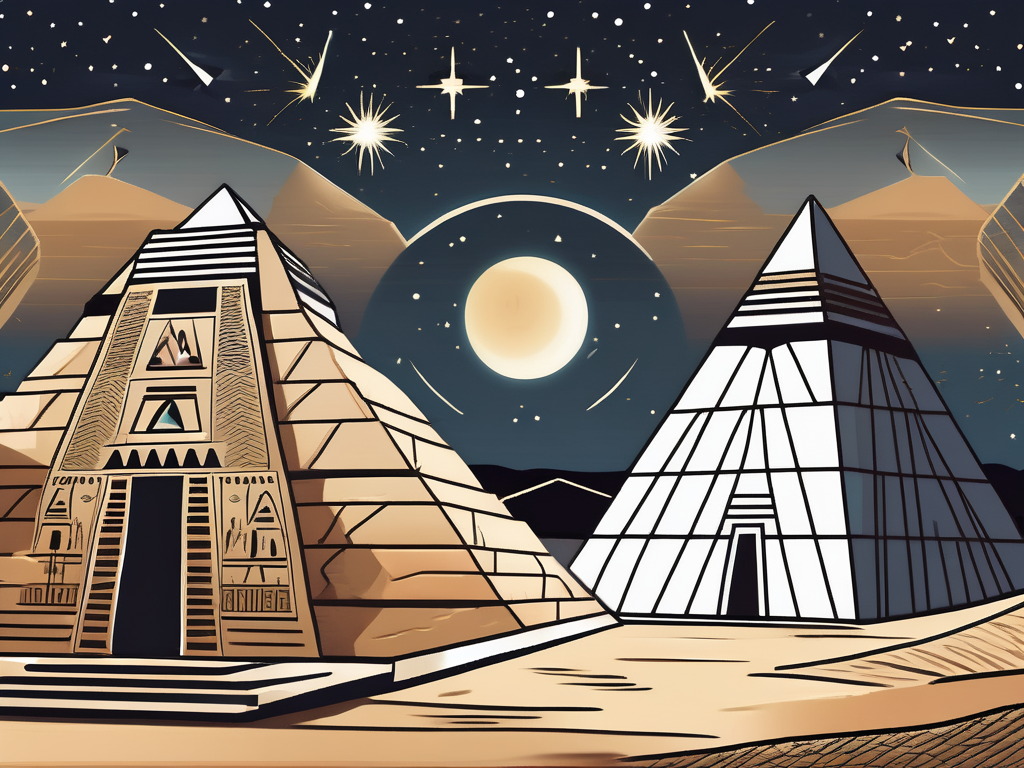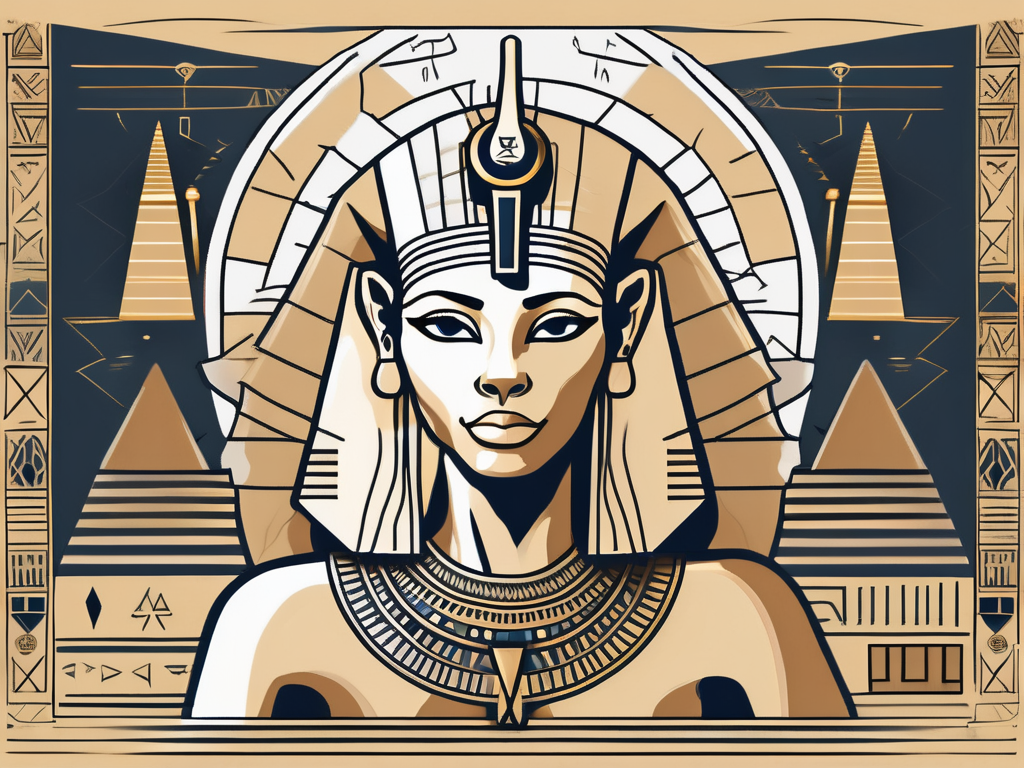Are you ready to delve into the captivating world of Egyptian mythology? If so, you’re in for a treat as we uncover the intriguing tales surrounding Yam, the Egyptian god. From his role in ancient society to his symbolism and influence on modern pop culture, Yam’s story is a captivating one that deserves our attention. So, let’s embark on this mystical journey and unearth the wonders of Yam!
Understanding Yam: An Overview
Before we immerse ourselves in the enigmatic world of Yam, let’s start with a brief overview of who he is. Yam was an ancient Egyptian deity associated with many elements, most notably the sea. As a god of chaos and disorder, he held a unique position in the Egyptian pantheon. Let’s explore his role further.
The Role of Yam in Egyptian Mythology
In Egyptian mythology, Yam played a significant part in the grand narrative of creation and the eternal struggle between order and chaos. He was often depicted as a serpent or a fearsome beast emerging from the depths of the sea. This portrayal represented the ever-present threat of chaos in ancient Egyptian beliefs.
Yam’s association with chaos went beyond being a mere representation of disorder. He was believed to embody the very essence of chaos itself, a force that constantly threatened to disrupt the delicate balance of the cosmos. The ancient Egyptians saw chaos as a necessary element for creation to occur, as it was through the struggle between order and chaos that life and the world were brought into existence.
Not only was Yam associated with chaos, but he was also closely tied to the natural forces of the sea. The vastness and unpredictability of the ocean mirrored the boundless nature of chaos, making it a fitting domain for Yam. The ancient Egyptians believed that the sea was a gateway to the unknown, a realm where the boundaries between the physical and spiritual worlds blurred. Yam, as the god of chaos and the sea, held immense power and influence over these mysterious realms.
Within the Egyptian pantheon, Yam’s role as a god of chaos brought a necessary counterbalance to the order maintained by the other deities. While the other gods and goddesses represented various aspects of creation and stability, Yam reminded the ancient Egyptians of the constant struggle between creation and destruction. His presence served as a reminder of the fragile equilibrium that underpinned their beliefs and the need to maintain harmony in the face of chaos.
Yam’s Place Among the Pantheon of Egyptian Gods
Within the vast Egyptian pantheon, Yam held a unique place. As a god of chaos, he represented the opposing force to the order maintained by the other deities. His presence reminded the ancient Egyptians of the constant struggle between creation and destruction, reinforcing the delicate balance of their beliefs.
Despite his association with chaos, Yam was not seen as an evil deity. Instead, he was regarded as a necessary part of the cosmic order. The ancient Egyptians recognized that chaos was not inherently negative but rather a vital force that drove the cycles of creation and renewal. Yam’s role as the god of chaos served as a reminder of the ever-present potential for change and transformation in the world.
In the pantheon, Yam interacted with other gods and goddesses, often engaging in cosmic battles that symbolized the eternal struggle between order and chaos. These conflicts were not seen as mere clashes of power, but rather as essential processes that ensured the continued existence and evolution of the universe. Yam’s role in these battles highlighted the significance of chaos in the grand tapestry of Egyptian mythology.
Furthermore, Yam’s association with the sea brought about a deep reverence for the natural world among the ancient Egyptians. The sea was seen as a source of life and abundance, providing sustenance and livelihood to the people. Yam’s connection to the sea made him a deity of great importance, as he held sway over the forces that shaped their daily lives.
In conclusion, Yam’s role in Egyptian mythology extended far beyond his association with chaos. He embodied the ever-present potential for change and transformation, reminding the ancient Egyptians of the delicate balance between order and chaos. His connection to the sea further emphasized his significance, as he held dominion over the natural forces that sustained their existence. Yam’s place among the pantheon of Egyptian gods was one of profound importance, symbolizing the eternal struggle that defined their cosmology.
The Symbolism Associated with Yam
One of the most intriguing aspects of Yam’s mythology lies in the symbolism associated with him. The ancient Egyptians depicted him in various forms of art and assigned profound meaning to his representations. Let’s explore the fascinating symbolism surrounding Yam.
Yam’s Depictions in Ancient Art
When it comes to ancient art, Yam was often portrayed as a serpentine creature intertwined with the sea. These depictions showcased his role as both a chaotic deity and one connected to the vastness of the water. The intricate and detailed representations served as a reminder of the power and unpredictability of the sea.
Furthermore, these artistic representations not only conveyed Yam’s connection to chaos but also underscored his potential to disrupt the established order of the world. A reminder to the ancient Egyptians that chaos could emerge from even the most serene and peaceful aspects of life.
The Significance of Yam’s Sea Association
Yam’s association with the sea carries great significance. The sea, with its vastness and unpredictability, served as a metaphor for the unknown and the forces that lay beyond human control. It represented the potential dangers and chaos that exist in the world, reflecting the complexities of life.
Moreover, Yam’s connection to the sea highlighted the Egyptians’ close relationship with and reliance on the Nile River. As the lifeblood of Egypt, the Nile provided sustenance and prosperity to the civilization. Yam symbolized the inherent risks and unpredictability of this vital water source.
Yam’s Influence on Ancient Egyptian Society
Yam’s presence extended beyond the realms of mythology and permeated various aspects of ancient Egyptian society. His influence can be observed in religious practices, cultural traditions, and even ancient texts.
Yam in Religious Practices and Rituals
Within religious practices, Yam often played a role in ceremonies and rituals associated with the sea. These rituals aimed to appease and seek protection from the unpredictable forces represented by Yam. The ancient Egyptians believed that through these rituals, they could maintain order and balance in their lives.
Additionally, Yam’s presence in religious practices served as a powerful reminder of the collective responsibility held by the Egyptians to maintain balance in their society. It promoted a sense of unity and shared purpose in preserving order amidst the chaos that life could bring.
Yam’s Impact on Ancient Egyptian Culture
Apart from religion, Yam’s influence can be traced in various aspects of ancient Egyptian culture. From artwork and literature to architecture and day-to-day practices, his mythology left an indelible mark on the civilization.
For example, the fearsome depictions of Yam in art served as a reminder of the potential dangers lurking beneath the surface of their seemingly calm world. This awareness influenced architectural decisions, such as the construction of protective walls and defensive structures to guard against chaos.
Yam’s Presence in Ancient Literature and Texts
In addition to his role in religious and cultural practices, Yam found his place in the ancient literature and texts of the time. Let’s explore two significant instances where Yam’s story intertwines with the narratives of ancient Egypt.
Yam in the Pyramid Texts
The Pyramid Texts, ancient funerary inscriptions found within the pyramids, contain references to Yam. Here, Yam is portrayed as a powerful adversary, embodying chaos and challenging the authority of the pharaoh. These texts emphasize the pharaoh’s role in maintaining order and defeating the chaotic forces personified by Yam.
Yam’s Role in the Story of Baal Cycle
Yam’s influence can also be seen beyond Egyptian borders in the ancient Near Eastern myth known as the Baal Cycle. In this tale, Yam, known as Yamm in the myth, represents chaos and poses a threat to Baal, the storm god. The story explores the eternal struggle between order and chaos, emphasizing Yam’s universal significance in the understanding of mythologies.
The Modern Interpretation of Yam
As mythologies continue to captivate our imagination, Yam’s story has also found its place in modern interpretations and discussions. Let’s explore how his mythology influences contemporary studies and pops up in popular culture.
Yam’s Influence on Contemporary Mythology Studies
Within the field of mythology studies, Yam’s story has become an area of fascination. Scholars continue to analyze his role in Egyptian mythology, uncovering new insights and connections. These studies shed light on the broader significance of Yam’s narrative and its impact on human understanding of the world.
Yam in Modern Pop Culture and Media
Yam’s presence extends beyond academic circles and has seeped into modern popular culture. Whether through books, movies, or video games, his story and symbolism find new life in the creative realms of entertainment. The enduring appeal of Yam showcases the timeless allure of ancient mythology and its ability to captivate modern audiences.
The Enigmatic Legacy of Yam
As we conclude our journey through the fascinating mythology of Yam, the Egyptian god of chaos, we begin to grasp the profound significance of his story. From his role in Egyptian society to his enduring symbolism and influence on popular culture, Yam’s legacy persists, reminding us of the eternal struggle between order and chaos. So, the next time you gaze upon the vastness of the sea or immerse yourself in ancient myths, remember the captivating tale of Yam, a deity whose story resonates throughout the ages.












